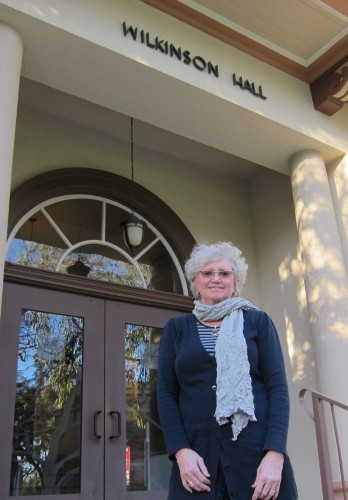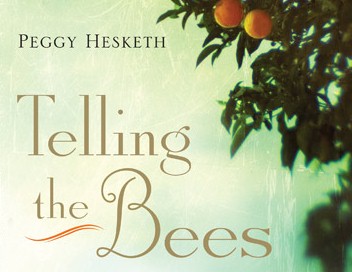
Novelist Peggy Hesketh (MFA/MA ’99) taught literature classes in Wilkinson Hall after completing graduate work at Chapman, where her new novel ‘Telling the Bees’ had its beginnings.
It’s been years since novelist Peggy Hesketh (MFA/MA ’99) taught literature classes in Chapman University’s Wilkinson Hall. But every once in a while, the 1904-era building comes back to haunt.
Whenever Hesketh has one of those anxious yikes-I’m-totally-unprepared dreams, which in her world means standing before a classroom of expectant students for a course she forgot was on her schedule, she’s reminded of her old teaching digs.
“Those dreams are always in Wilkinson Hall,” Hesketh says with a laugh.
Happily, the fretful dreams are not the only legacy of Hesketh’s time at Chapman University as a graduate student and later a writing instructor. It is also the place where her debut novel, Telling the Bees
(Putnam, 2013), a literary mystery set in Orange County, was shaped and written as her thesis project. Telling the Bees is the story of elderly Anaheim bee keeper Albert Honig who one day discovers the two elderly sisters next door have been murdered in their home. What follows is both a murder mystery and the story of lives scarred by regrets and secrets.
And Wilkinson Hall nightmares aside, Hesketh says her years in the Chapman creative writing program is where she honed the story beyond straight mystery and developed the voice of Albert. She credits Chapman’s supportive environment.
“What I thought was just the best thing about Chapman is that there were all small classes, and I had a great cohort (of fellow classmates),” says Hesketh, a former Orange County journalist. “There were really terrific people who were just there at all hours for you. I’ve gone to a lot of schools. This was by far the most nurturing.”
But after graduation, she was ready for a break. She put it aside and turned her focus to a busy teaching career, which eventually led to a full time teaching position at UC Irvine. Then a decade after she shelved her thesis novel, she had the rare luxury of an open summer and launched into revisions with the goal of sending it out to agents. When she thought it was ready, she shared it with an early mentor, mystery writer Elizabeth George, to see “if it was even close.” George loved it, sent it to her agent, who took it on and sold it to Putnam within days.
Then just as Hesketh began revisions requested by her new editor, she was diagnosed with breast cancer. So began some long days. She balanced a treatment schedule with her editor’s requests, while dealing with fatigue and “chemo brain.”
But Hesketh triumphed on both fronts. She is well again and the book is receiving top reviews, including from the Library Journal, which listed it as a starred review and described it as being reminiscent of Marilynne Robinson’s Gilead. A novel revision and cancer treatment was a lot to tackle at the time, but she now thinks the double challenge helped her prevail.
“I was so grateful during the most difficult moments of the treatment that I had something so close to my heart to work on every day,” she says. “Bottom line: the treatment slowed me down but the book revision process is one of the reasons I believe I not only survived but ultimately thrived.”





Add comment